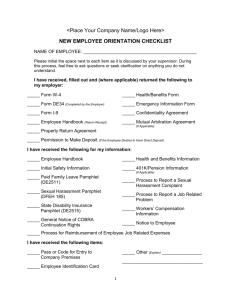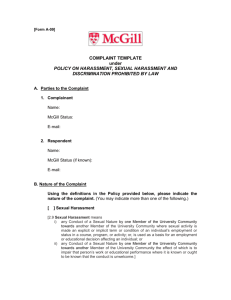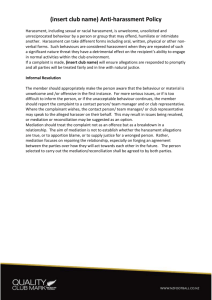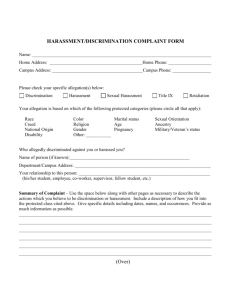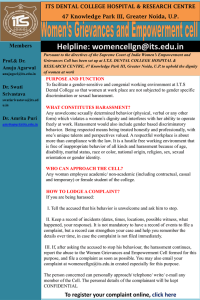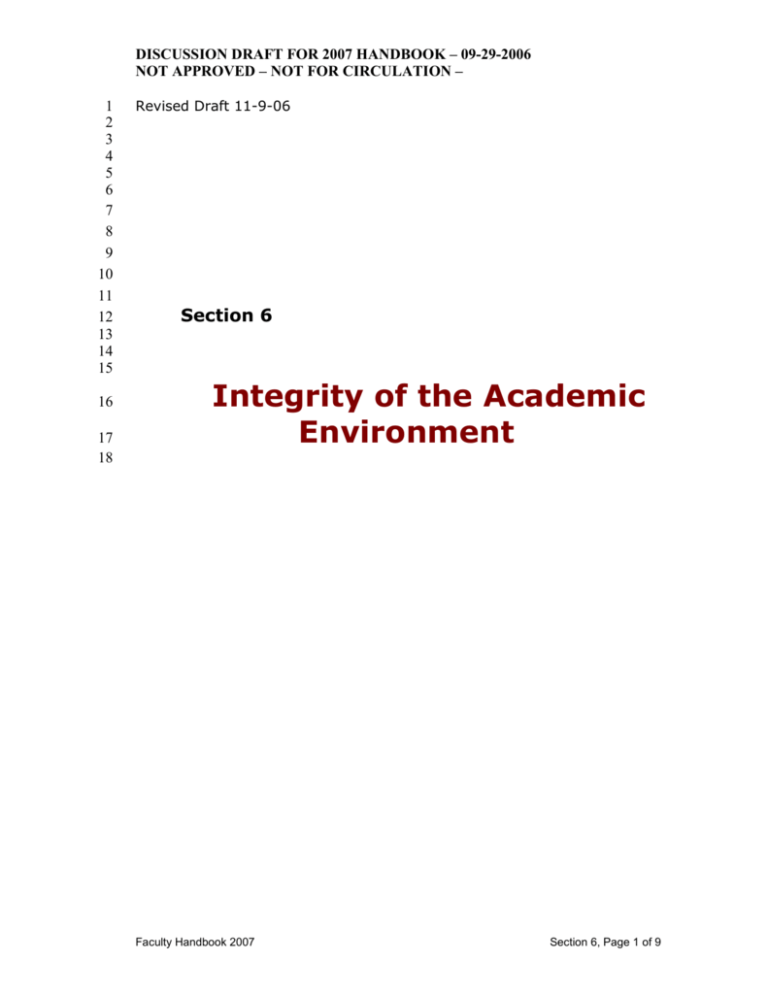
DISCUSSION DRAFT FOR 2007 HANDBOOK – 09-29-2006
NOT APPROVED – NOT FOR CIRCULATION –
1
2
3
4
5
6
7
8
9
10
11
12
13
14
15
16
17
18
Revised Draft 11-9-06
Section 6
Integrity of the Academic
Environment
Faculty Handbook 2007
Section 6, Page 1 of 9
DISCUSSION DRAFT FOR 2007 HANDBOOK – 09-29-2006
NOT APPROVED – NOT FOR CIRCULATION –
1
2
3
4
5
6
7
8
9
10
11
12
13
14
15
16
17
18
19
20
21
22
23
24
25
26
27
28
29
30
31
32
33
34
35
36
37
38
39
40
41
42
43
44
45
46
47
48
6-A
EQUAL EMPLOYMENT OPPORTUNITY POLICY
The University of Southern California values diversity and is committed to
equal opportunity in employment.
It is the University of Southern California’s policy not to discriminate and to
provide equal employment opportunity to all qualified individuals regardless
of race, color, age, sex, religion, national origin, ancestry, physical disability,
mental disability, medical condition, marital status, sexual orientation,
pregnancy, childbirth or related medical conditions, and status as a disabled
or other covered veteran. This policy applies to all employment actions
including recruitment, hiring, promotion, demotion, termination, provision of
support and leaves, and compensation, as well as upgrading and transfer.
University policy requires that all employment actions be consistent with the
provisions of applicable state, federal and local law. All members of the USC
community share responsibility to ensure USC’s compliance with this policy.
The Office of Compliance and the Office of Equity and Diversity have been
assigned the duties to design, coordinate the implementation of and monitor
progress under USC’s affirmative action programs.
To carry out this University policy, USC will not tolerate statements or actions
that create a discriminatory or harassing work or academic environment.
USC will not tolerate any coercion, intimidation, interference or other
retaliation for making a complaint or assisting in any investigation. If any
faculty or staff employee believes in good faith that there has been a
violation of our policies prohibiting discrimination, harassment or retaliation,
he or she is expected to immediately bring the matter to the attention of the
Office of Equity and Diversity at 213.740.5086. USC will investigate and take
appropriate action in response to such complaints. Faculty or staff
employees who violate our policies prohibiting discrimination, harassment or
retaliation will be subject to appropriate disciplinary action, including
termination or dismissal for cause in accordance with University policies.
USC strives to build a community in which each person respects the rights of
other people to be proud of who and what they are, to live and work in peace
and dignity, and to have an equal opportunity to realize their full potential as
individuals and members of society. To this end, the University places great
emphasis on those values and virtues that bind us together as human beings
and members of the Trojan Family.
6-B
POLICY AGAINST DISCRIMINATION, HARASSMENT, AND
RETALIATION
No employee of the University, whether faculty or staff, may discriminate
against or harass anyone on any basis prohibited by law, including those
specified in Section 6-A. No faculty or staff employee of the University may
retaliate against anyone who, in good faith, raises a complaint under this
Faculty Handbook 2007
Section 6, Page 2 of 9
DISCUSSION DRAFT FOR 2007 HANDBOOK – 09-29-2006
NOT APPROVED – NOT FOR CIRCULATION –
1
2
3
4
5
6
7
8
9
10
11
12
13
14
15
16
17
18
19
20
21
22
23
24
25
26
27
28
29
30
31
32
33
34
35
36
37
38
39
40
41
42
43
44
45
46
47
48
policy or under applicable law or participates in the investigation of such a
complaint. Attempts or threats to discriminate, harass or retaliate are
equally prohibited. Complaints and witness statements that are not in good
faith, are also prohibited and may lead to discipline under the relevant
University policies on misconduct..
All members of the University community, whether faculty, staff or students,
should be treated with dignity and respect. No University employee, whether
faculty or staff, may take actions that are harassing, abusive, or intimidating
against another member of the university community. Such actions should
be reported and investigated as provided in this policy. If the action was not
committed on the basis of a characteristic specified in Section 6-A, it may
lead to discipline under the relevant University policies on misconduct.
6-C
RACIAL AND ETHNIC HARASSMENT
Racial or ethnic harassment includes, but is not limited to, derogatory racial
or ethnic remarks, and racial or ethnic slurs, jokes, or epithets.
6-D
SEXUAL HARASSMENT
Sexual harassment consists of unwelcome sexual advances, requests for
sexual favors, and other verbal or physical conduct of a sexual nature when:
submission to such conduct is either explicitly or implicitly made a
term or condition of an individual’s employment, appointment,
admission, or academic evaluation; or
submission to such conduct is used as a basis for evaluation in
personnel decisions or academic evaluations affecting an individual; or
such conduct has the purpose or effect of unreasonably interfering
with an individual’s work or academic performance, or creating an
intimidating, hostile, or offensive working or learning environment.
Specific examples of sexual harassment include, but are not limited to, the
following:
written examples: suggestive or obscene letters, notes, and e-mails.
verbal examples: derogatory comments, slurs, jokes, or epithets of a
sexual nature or sexist remarks, requests for sexual favors, repeated
and unwelcome propositions for dates.
physical examples: assaults, impeding or blocking movement,
touching, or body contact.
Faculty Handbook 2007
Section 6, Page 3 of 9
DISCUSSION DRAFT FOR 2007 HANDBOOK – 09-29-2006
NOT APPROVED – NOT FOR CIRCULATION –
1
2
3
4
5
6
7
8
9
10
11
12
13
14
15
16
17
18
19
20
21
22
23
24
25
26
27
28
29
30
31
32
33
34
35
36
37
38
39
40
41
42
43
44
45
46
47
48
visual examples: sexual gestures, inappropriate display of sexually
explicit objects, pictures, cartoons, posters, or drawings.
6-E WORKPLACE HARASSMENT PREVENTION TRAINING
All faculty and staff employees must periodically complete required training
programs provided by the University. Additional examples of racial, ethnic,
and sexual harassment are provided in this training..
6-F PROCEDURES FOR COMPLAINTS BY OR AGAINST FACULTY
6-F (1)
Reporting a Complaint
Anyone who believes he or she has been discriminated against, harassed, or
retaliated against in violation of this policy, should report the fact to the
Director of the Office of Equity and Diversity or an investigator in that office
(“Designated Investigator”) at 213-740-5086.
Alternatively, such report may be made to any of the following “Designated
Recipients”: For complaints by or against faculty members, the chair of the
complainant’s or alleged offender’s department; the dean or associate dean
for faculty affairs of the complainant’s or alleged offender’s school; or the
Vice Provost for Faculty Affairs. For complaints by or against staff members,
such a report may also be made to the head of the division or department
who has the rank of assistant vice president or higher, or to a University
Personnel Director. A Designated Recipient who receives a complaint shall
promptly inform the Office of Equity and Diversity, as spelled out in Section
6-D(5).
Complainants are expected to bring complaints of violation of this policy to
the Office of Equity and Diversity or a Designated Recipient as soon as
possible. Delay in taking formal action with respect to an incident may
foreclose other remedies under federal or state law.
In the absence of a complaint, the University may initiate an investigation if
it has reason to believe that this policy has been violated.
In addition to notifying the University about unlawful discrimination,
harassment, or retaliation, affected employees also may direct their
complaints to the California Department of Fair Employment and Housing
(“DFEH”) or the Equal Employment Opportunity Commission (EEOC), which
have the authority to conduct investigations of the facts. The deadline for
filing complaints with the DFEH is one year from the date of the alleged
unlawful conduct. If the DFEH believes that a complaint is valid and
settlement efforts fail, the DFEH may seek an administrative hearing before
the California Fair Employment and Housing Commission (“FEHC”) or file a
lawsuit in court. Both the FEHC and the courts have the authority to award
monetary and non-monetary relief in meritorious cases. A complainant can
contact the nearest DFEH or EEOC office or the FEHC at the locations listed in
Faculty Handbook 2007
Section 6, Page 4 of 9
DISCUSSION DRAFT FOR 2007 HANDBOOK – 09-29-2006
NOT APPROVED – NOT FOR CIRCULATION –
1
2
3
4
5
6
7
8
9
10
11
12
13
14
15
16
17
18
19
20
21
22
23
24
25
26
27
28
29
30
31
32
33
34
35
36
37
38
39
40
41
42
43
44
45
46
47
48
the University’s DFEH poster or by checking the state government listings in
the local telephone directory.
6-F (2)
Confidentiality
Although the University cannot commit to keeping a complaint of harassment
confidential because of the University’s obligation to investigate the
complaint, the University will use its best efforts not to disseminate
information concerning the complaint beyond those who have a need to
know.
6-F (3)
Warning Against Retaliation
The Designated Investigator shall inform the complainant that (1) the law
and the University’s rules prohibit threatened, attempted, or actual
retaliation against him or her for bringing a good faith complaint, or against
any participant in good faith in the investigation, or against any person who
in good faith protests the alleged discrimination, harassment, or retaliation;
and (2) any incident of retaliation must be reported immediately to the Office
of Equity and Diversity or any Designated Recipient identified in Section 6-D
(1).
In addition, when the Designated Investigator investigates the complaint, he
or she shall warn the alleged offender(s) that retaliation is strictly prohibited.
6-F (4)
Informing Office of Equity and Diversity
If the complaint of discrimination, harassment, or retaliation is made initially
to a Designated Recipient identified in Section 6-D (1) (other than the
Designated Investigator), the recipient of the complaint shall immediately
inform the Office of Equity and Diversity. A written statement is preferred,
but not required. Any notification, whether written or not, must include (1)
all known information about the alleged discrimination, harassment, or
retaliation; (2) the names of the complainant and of the alleged offender(s),
if known; and (3) any additional information which would enable the
investigator to investigate the allegation.
It is very important that the Designated Recipient of the complaint follow
these directions. If the Designated Recipient fails to do so, the University
and he or she could be exposed to legal risk.
Upon receipt of an allegation by or against a faculty member, the Office of
Equity and Diversity shall notify the appropriate dean and the Vice Provost
for Faculty Affairs.
The University may appoint an independent investigator to function as
Designated Investigator in lieu of the Office of Equity and Diversity.
Faculty Handbook 2007
Section 6, Page 5 of 9
DISCUSSION DRAFT FOR 2007 HANDBOOK – 09-29-2006
NOT APPROVED – NOT FOR CIRCULATION –
1
2
3
4
5
6
7
8
9
10
11
12
13
14
15
16
17
18
19
20
21
22
23
24
25
26
27
28
29
30
31
32
33
34
35
36
37
38
39
40
41
42
43
44
45
46
47
6-F (5)
Investigation
The Designated Investigator shall promptly investigate the complaint to
determine whether there is a sufficient basis to conclude that a violation of
this policy has occurred. In the conduct of the investigation, the Designated
Investigator shall present the alleged offender(s) with sufficient information
so that he or she can meaningfully respond in writing, verbally, or both. The
investigation will be conducted in accordance with the University’s policies
and procedures generally applicable to investigations by the Office of Equity
and Diversity. See the University Policies website for the “Discrimination and
Harassment Complaint Procedures.” The alleged offender may seek advice
from the Academic Senate President and the Senate Committee on Faculty
Rights and Responsibilities
6-F (6)
Investigator’s Report
The Designated Investigator shall make a written report of his or her
investigation and determination as soon as possible. The complainant and
the alleged offender will be notified of the results of the investigation.
For complaints against staff, the Associate Senior Vice President for
Administrative Operations, will receive and review the investigative report
and, when warranted, take appropriate corrective action, including any
disciplinary action deemed appropriate. If the Associate Senior Vice
President for Administrative Operations is not available, the Senior Vice
President, Finance, will act instead.
For complaints against faculty, the Vice Provost for Faculty Affairs will receive
and review the investigative report and consult with the President of the
Academic Senate and the relevant dean. When warranted and considering
the seriousness of the offense and all the circumstances, the Vice Provost will
proceed to take action as set forth in Section 6-G (except that dismissal for
cause and demotion as defined in Section 8-C(5) shall occur only pursuant to
the formal proceedings set forth in Section 8-C(2), commencing with Step 4,
if the Provost decides to bring formal charges on the recommendation of the
Vice Provost.) If the Vice Provost for Faculty Affairs is not available, the
Provost will designate another Vice Provost to act instead.
6-G RIGHT TO A HEARING
With respect to any sanction or corrective action taken by the Vice Provost,
the faculty member will be entitled, within ten days of being notified of the
Vice Provost’s decision, to grieve the decision pursuant to Section 7 of this
Faculty Handbook.
In cases of alleged sexual harassment or discrimination or retaliation in
which the complainant and the respondent are of the opposite sex, the
Faculty Handbook 2007
Section 6, Page 6 of 9
DISCUSSION DRAFT FOR 2007 HANDBOOK – 09-29-2006
NOT APPROVED – NOT FOR CIRCULATION –
1
2
3
4
5
6
7
8
9
10
11
12
13
14
15
16
17
18
19
20
21
22
23
24
25
26
27
28
29
30
31
32
33
34
35
36
37
38
39
40
41
42
43
44
45
46
47
48
grievance hearing panel, or the Step 5 hearing panel for a dismissal or
demotion, shall include at least one woman and one man.
If a faculty member grieves certain sanctions, and the Provost also brings
forward charges seeking dismissal or demotion of the faculty member, the
same panel will function as a grievance hearing panel and Step 5 hearing
panel.
6-H SANCTIONS AND CORRECTIVE ACTIONS
In the case of complaints against faculty for discrimination, harassment, or
retaliation, sanctions and corrective action may include, but are not limited
to, any of the following:
approving an informal resolution;
ensuring that the person against whom the complaint is made is not
called upon to write letters of recommendation or make academic
judgments about the person making the complaint or any other
decision that affects the academic or professional career of the
complainant or witnesses (and making alternative arrangements if
necessary);
changing advisers, graders, line of supervision, or physical locations of
work;
conducting training, holding discussions, distributing leaflets, showing
videos or films, or sending letters in the relevant unit explaining the
University’s policy on discrimination, harassment, or retaliation;
action to remedy harm to the complainant or witnesses, e.g.,
reinstatement of teaching assistantships from which complainant or
witness was removed by the accused or re-evaluation of course work
graded unfairly by the accused;
reviewing materials in the complainant’s or witness’s file and, if there
is evidence of materials placed in the file by the individual as an act of
retaliation, to remove such materials when appropriate;
counseling of the individual by his or her supervisor(s), such as the
dean, Vice Provost, or Provost, about the individual’s behavior;
oral warning of the individual by his or her supervisor(s), such as the
dean, Vice Provost, or Provost, with a record in the individual’s
personnel file, that the individual’s apparent behavior constitutes a
violation of the University’s policy on discrimination, harassment, or
retaliation;
Faculty Handbook 2007
Section 6, Page 7 of 9
DISCUSSION DRAFT FOR 2007 HANDBOOK – 09-29-2006
NOT APPROVED – NOT FOR CIRCULATION –
1
2
3
4
5
6
7
8
9
10
11
12
13
14
15
16
17
18
19
20
21
22
23
24
25
26
27
28
29
30
31
32
33
34
35
36
37
38
39
40
41
42
43
44
45
written warning of the individual by his or her supervisor(s), such as
the dean, Vice Provost, or Provost, with a copy to the individual’s
personnel file, that the individual’s apparent behavior violates the
University’s policy on discrimination, harassment, or retaliation;
elimination or reduction of merit increases for the next year;
removing the individual from a University administrative position;
denial of promotion or postponement of consideration for promotion;
suspension without pay, for a period not to exceed one semester;
reduction in salary;
for faculty who do not hold tenure, non-reappointment or termination
effective at the end of the current academic or fiscal year; or effective
on 90 days notice or pay in lieu of notice.
demotion as defined in Section 8-C(5);
dismissal for cause.
6-I CONSENSUAL RELATIONSHIPS
Sexual relationships between a faculty member and student, or persons in a
supervisor-supervisee position, are discouraged. They may give rise to legal
concerns as well as ethical concerns and conflicts between personal and
professional interests. A relationship may be voluntary in the sense that an
individual is not forced to participate against his or her will, yet it may be
unwelcome and therefore result in a claim of sexual harassment.
If a sexual relationship ends, and a participant finds that future conduct by
the former partner is unwelcome, he or she is expected to give explicit notice
to the former partner in clear, unambiguous terms of the fact that the
relationship is over and future conduct or comments of a sexual nature are
unwelcome.
The University does not permit the fact of a relationship between any
employee and another to create favored or disadvantageous treatment. In
other words, the person with whom one is having a sexual relationship may
not receive more favored treatment because of that relationship, nor may
those who are not in such a relationship be subjected to disadvantageous
treatment on that basis.
Therefore, if there is a consensual sexual relationship between a faculty
member and a student, another faculty member or other employee and the
faculty member evaluates or supervises that person, the faculty member
Faculty Handbook 2007
Section 6, Page 8 of 9
DISCUSSION DRAFT FOR 2007 HANDBOOK – 09-29-2006
NOT APPROVED – NOT FOR CIRCULATION –
To protect privacy, faculty
members who choose to recuse themselves from such decisions or
supervisory responsibilities are not required to state reasons.
must not evaluate or supervise that individual.
If a faculty member is in doubt concerning the possibility of a conflict
of interest, it is recommended that the faculty member consult the
department chair or dean. A department chair or dean who has
similar doubts should initiate discussion with the faculty member; and
any other faculty member with such concerns should raise them with
the chair or dean, who should take appropriate steps. Advice in these
situations should be sought from the Vice Provost for Faculty Affairs
and the President of the Faculty. Confidentiality shall be protected to
the fullest extent possible.
1
Faculty Handbook 2007
Section 6, Page 9 of 9



